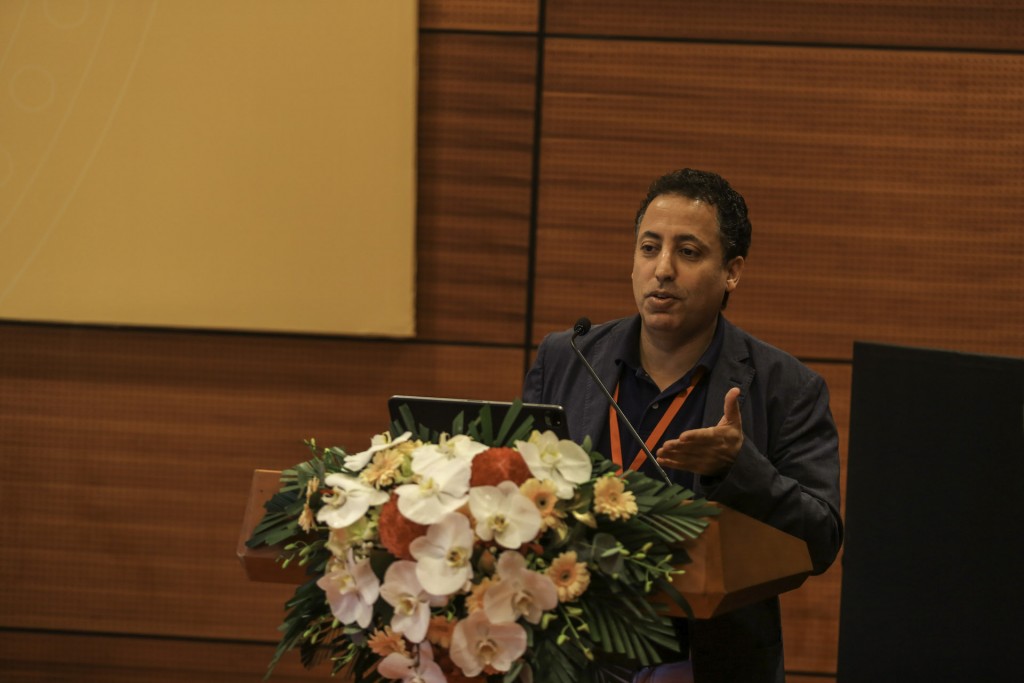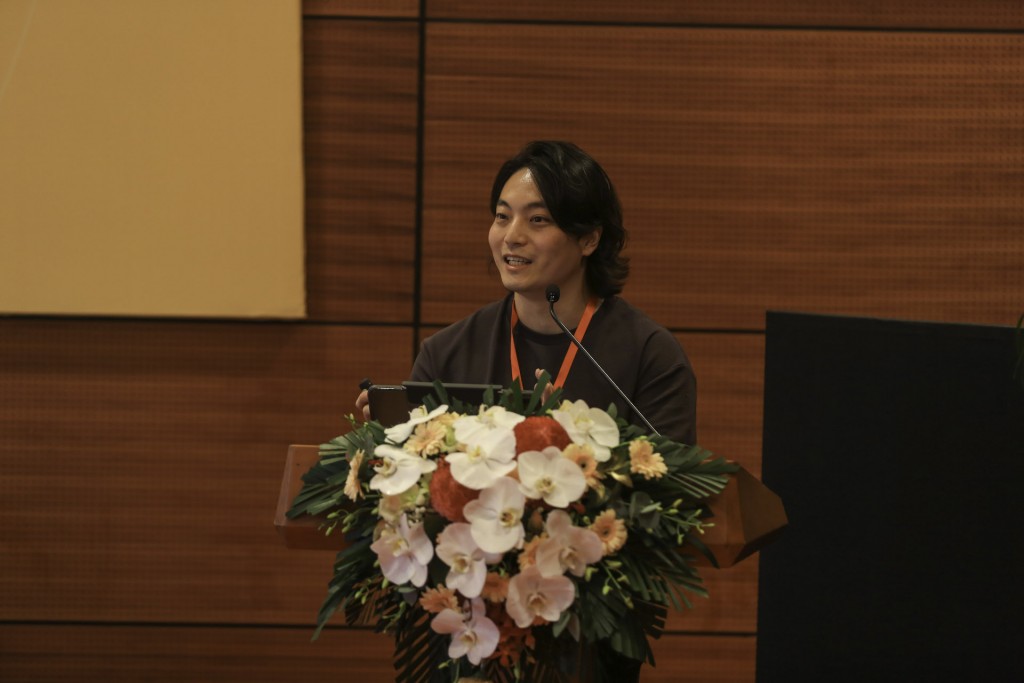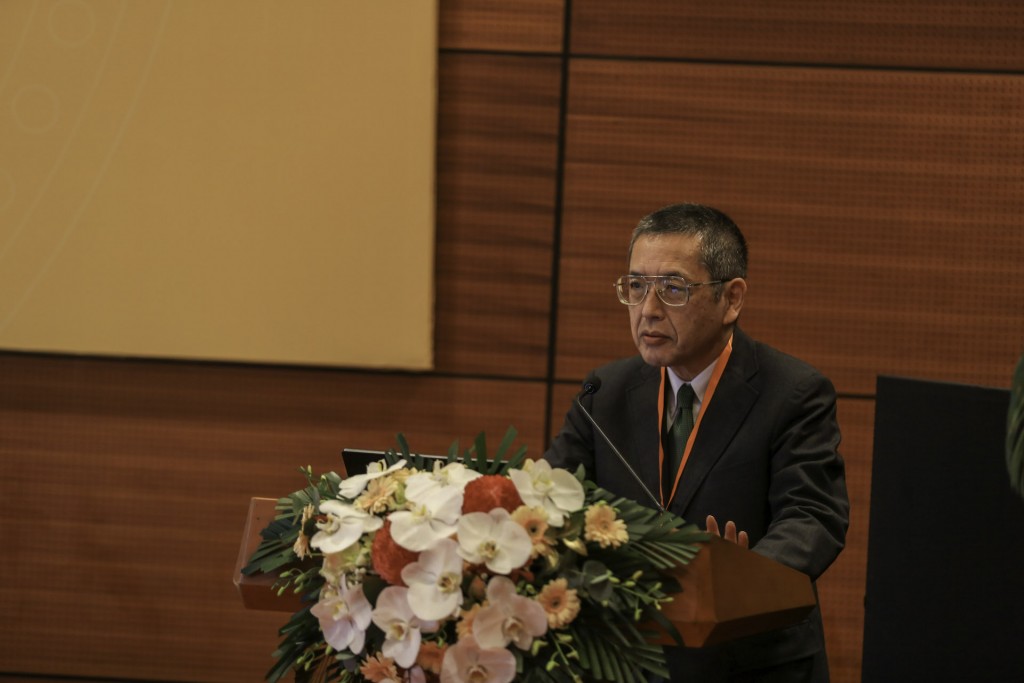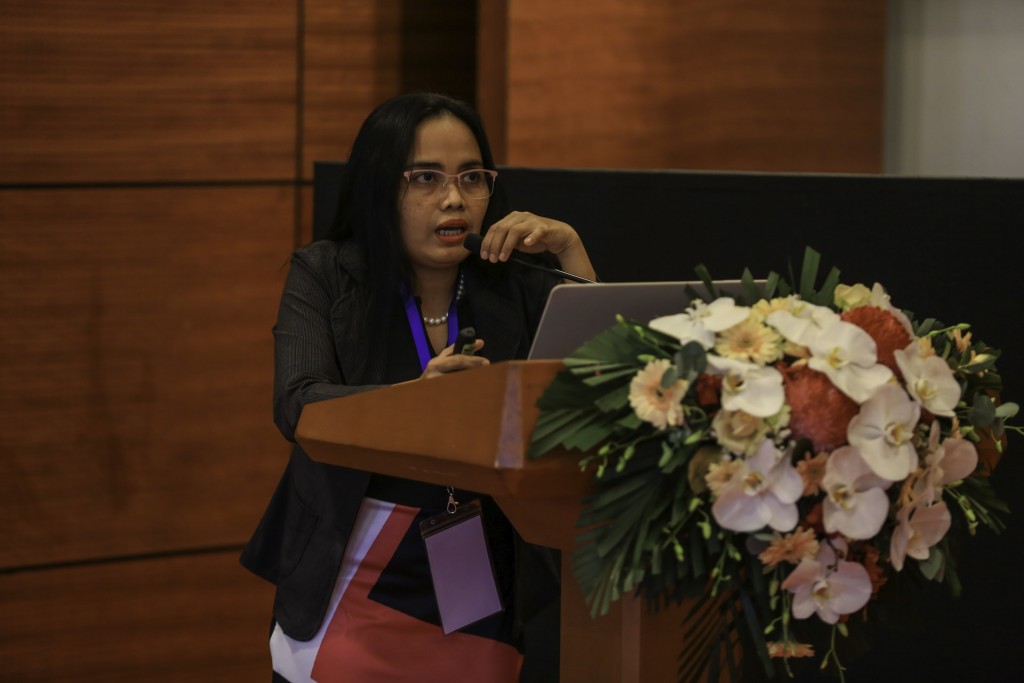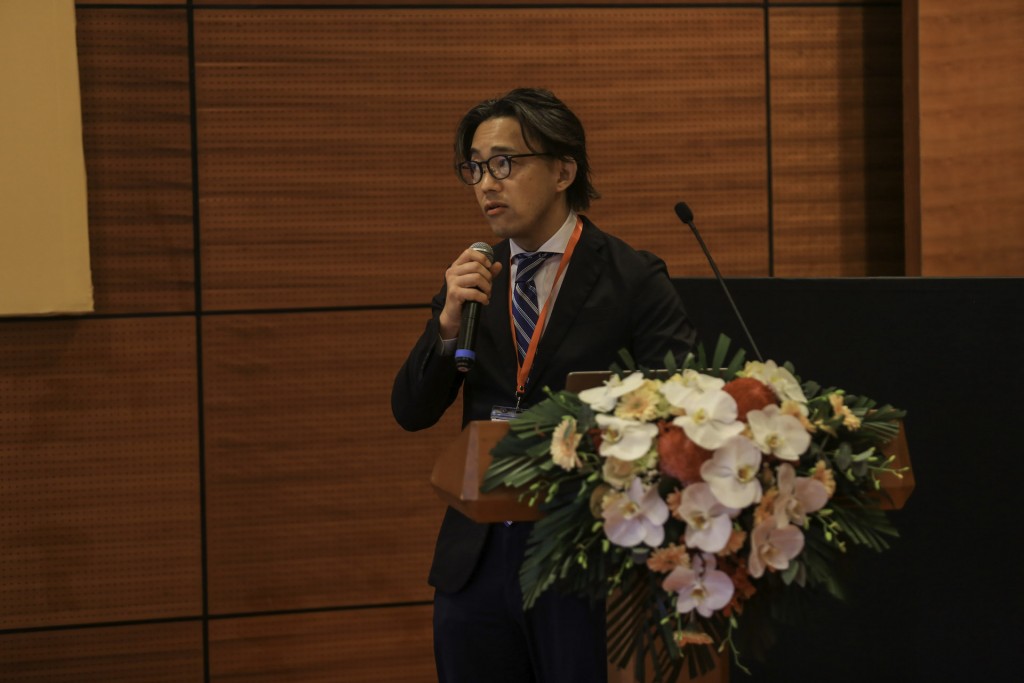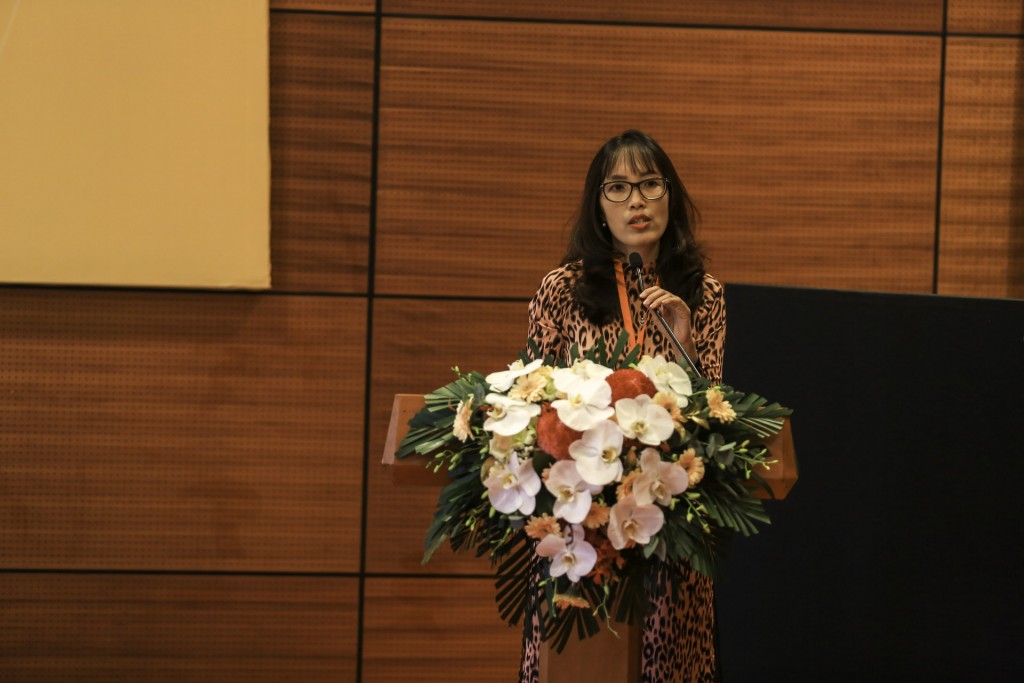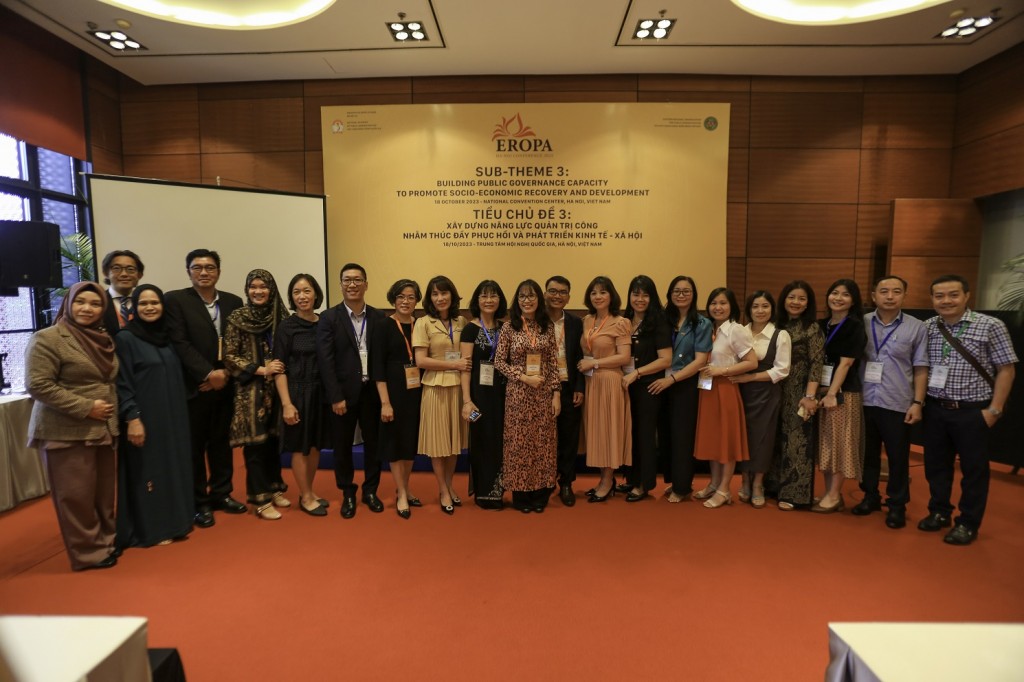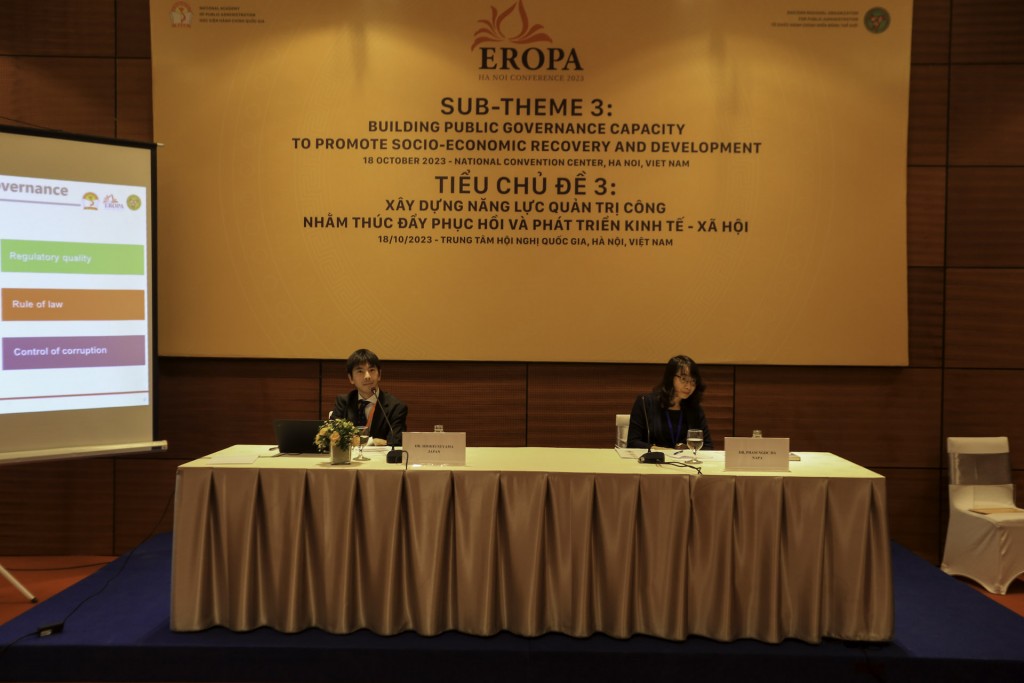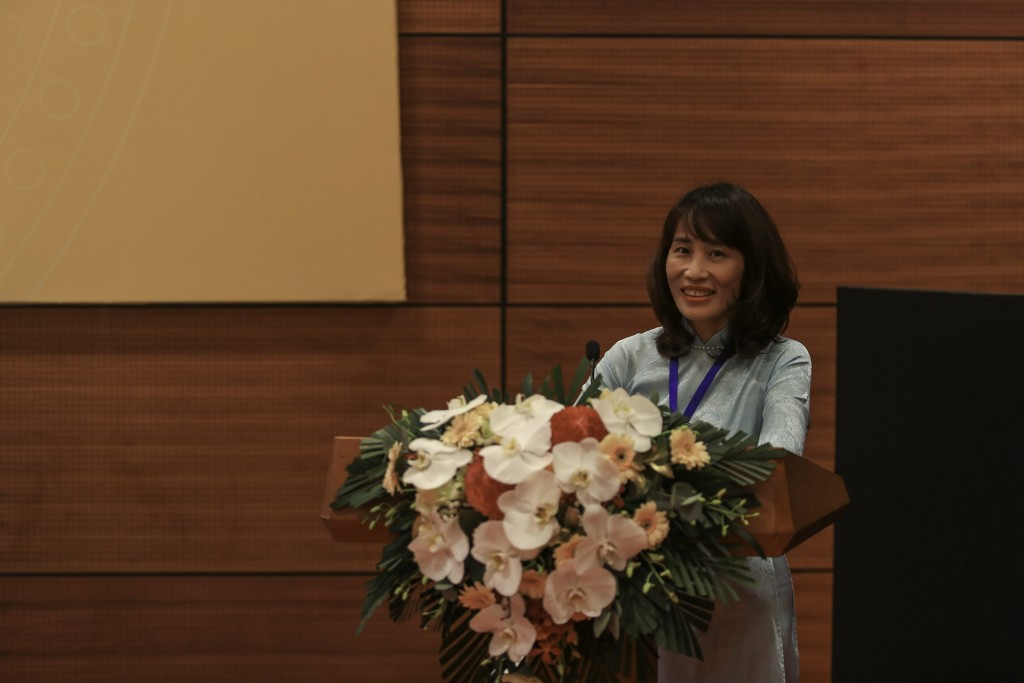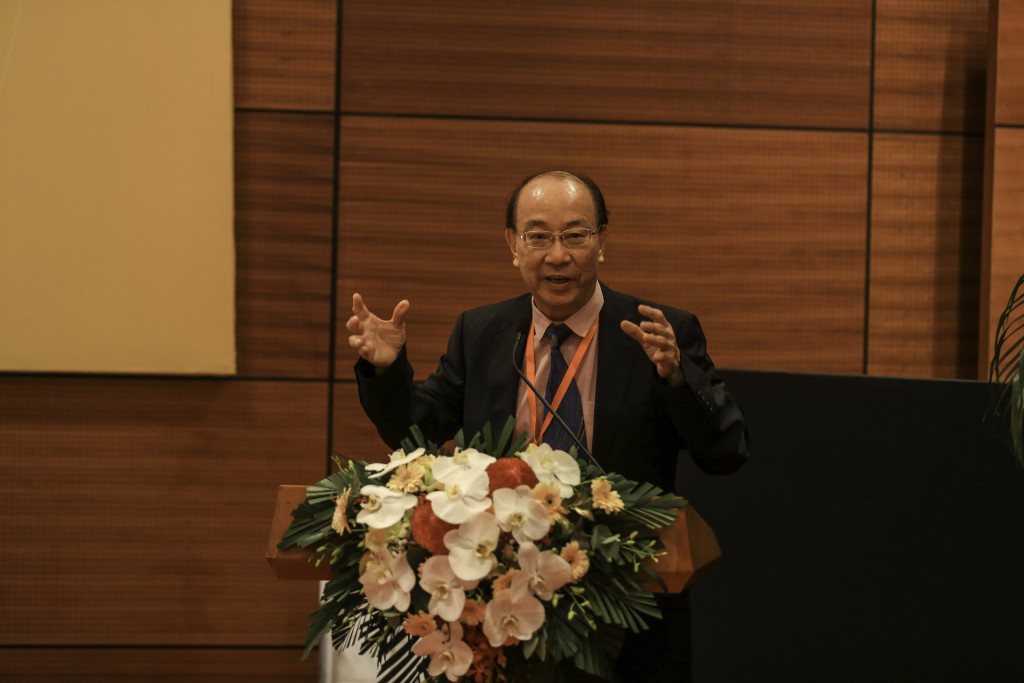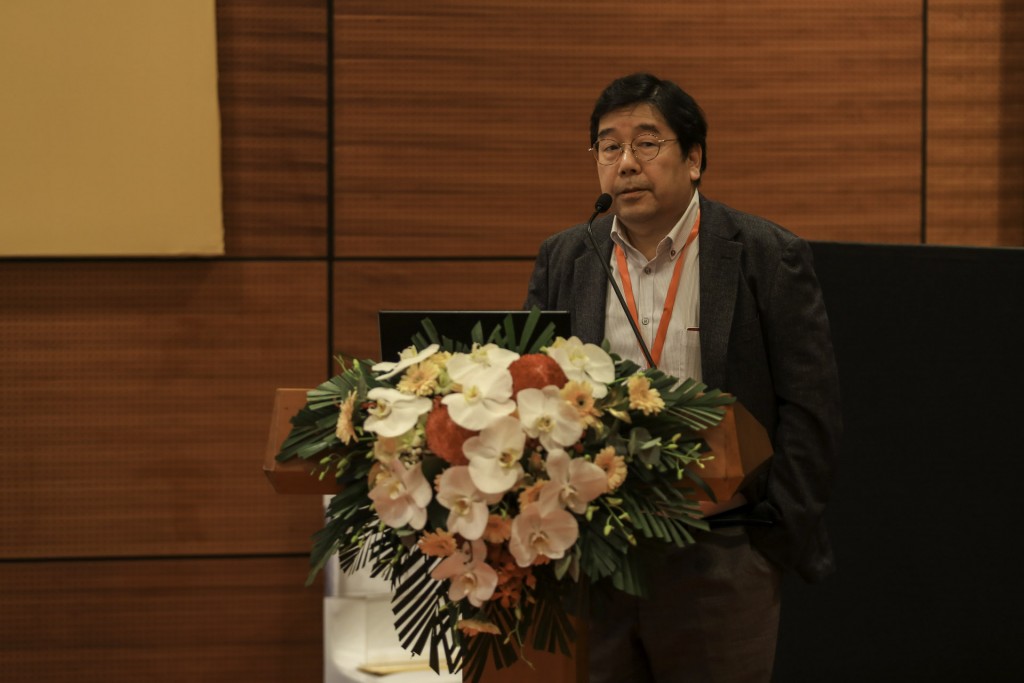On October 18, at the National Convention Center, Hanoi, three parallel sessions took place as part of the program of the 2023 EROPA Conference. Sub-theme 3 session titled “Building public governance capacity to promote socio-economic recovery and development” engaged presenters in lively discussion.
Morning session, Sub-theme 3
Dr. Kristoffer Berse, National College of Public Administration and Governance, University of the Philippines, Ms. Maricel Fernandez Carag, De La Salle College of Saint Benildeand, and Dr. Hoang Vinh Giang, National Academy of Public Administration, moderated the morning session.
The morning session consisted of 15 presentations covering various topics related to building public governance capacity, approached at different levels and closely connected to each locality, region, and country. These presentations sparked numerous ideas for each delegate in various fields of work.
Mr. Marlon Tagorda, Municipality of Ilocos Sur, Philippines, presented the paper “Leveraging on Legislative Autonomy to Establish a Local Economic Development Agenda of the 10th Sangguniang Panlalawigan of Ilocos Sur”. The greatest outcome of this research is in shaping and defining public management at the Provincial Government of Ilocos Sur. The Local Government Code of 1991 stipulates that local government units shall endeavour to be self-reliant, thus must deviate from their dependence on the Internal Revenue Allotment by generating their own revenues by influencing local economic development. However, not all local governments have the capacity to implement this regulation, and regular legislative diagnosis needs to be conducted for monitoring, evaluation, accountability, and learning.
Dr. Younes Abouyoub, United Nations, presented his paper “Rebuilding public governance for sustainable development in post-conflict least developed countries in the Middle East and Africa”. According to him, least developed countries account for about 12% of the global population, and their contribution to global trade and economic activity is quite limited. His study examines the challenges of restoring effective public governance in crisis and post-conflict countries in three least developed countries namely Somalia, Sudan and Yemen.
Dr. Bernadette G. Gumba, Partido State University, Philippines, presented the paper “Cost-effectiveness of implementing community quarantine in selected areas of the Partido District, Philippines”. The study measured the cost-effectiveness of community quarantine implemented by selected local government units in Partido District, Philippines. Research shows that the number of Covid-19 cases as well as the average daily cost of patients, decreased significantly after the community quarantine periods.
Dr. Jennifer San Jose, Partido State University, Philippines, presented the paper “Implementation of the Citizen’s Charter of frontline service providers in 4th district, Camarines Sur, Philippines”. Her research delved into: (1) the compliance of the local government units with the information requirements of the Citizens’ Charter, and (2) the feedback on its implementation. The study is descriptive-evaluative in nature, involving 161 respondents, including key officials, frontline service providers, and service recipients. The study recommends other relevant agencies to strengthen the implementation of the Citizen’s Charter through awareness programs, capacity building, monitoring and updating of the Citizen’s Charter, as well as continuous research activities and extension undertakings of academic and field practitioners.
Mr. JuHo Jung, Sungkyunkwan University, Korea, gave a presentation related to research on turnover intentions and structural factors of new public officials. According to him, the reform of the public employees’ pension is one of the key factors that cause structural differences. The purpose of this study is to ascertain whether structural factors exist in the change in the intention to change jobs for young new public officials in Korea. As the turnover of new public officials in their 20s and 30s continues to rise, a number of studies are being conducted to examine the impact of job, organization, and personal factors on their turnover intention.
Dr. Paulito Nisperos and Dr. Jerome Orate from Don Mariano Marcos Memorial State University, Philippines, presented their paper with the topic “Build, build, build: Government implemented transportation infrastructure projects as booster to socio-economic development in the province of La Union”. This descriptive-quantitative study aims to evaluate the current status of transportation infrastructure projects and project management systems employed in the Engineering districts of La Union. In general, stakeholder assessment suggests sub-par to very weak management of projects. Policies on stakeholder competency assessment, proactive auditing, participatory and sustainable development are therefore recommended.

Ms. Sharon Grace P. Suarez-Yabut, National College of Administration and Governance, University of the Philippines, presenting her paper.
Ms. Sharon Grace P. Suarez-Yabut, National College of Public Administration and Governance, University of the Philippines, presented the paper “Designing a conceptual framework towards strengthening institutional resilience of public administration: An assessment of public governance resiliency in the Philippine development plans of the Duterte and Aquino administrations”. The study aims to articulate resilience theories in practice while further assessing resilience factors and governance styles in public administration to handle threats affecting the structural and procedural system. It will emphasize a call to action in translating theories and concepts to suggest reforms in designing a resilient public administration toward building good public governance.
Dr. Akio Kamiko, College of Policy Science, Ritsumeikan University, Japan, presented his paper “Introduction of whistle-blowing systems in municipalities in Kyoto prefecture, Japan”. Whistleblowing systems are new additions in Japan’s local government system and are not introduced nationwide. However, the Japanese central government has recently been focusing on Internal Control of local governments, and the whistleblowing system is considered one of the tools for this. The reason is due to population reduction and migration of population to limited core areas of the country, pushing many local governments into a financial dire state and mismanagement of local government affairs.
Prof. Arnold Lorenzo, Tarlac Agricultural University, Philippines, presented his paper: “Ensuring students’ access to higher education in the new normal through online admission system”. The research focuses on the development of an online system to facilitate the student admission process to the university. This system is important in ensuring the quality of higher education, and this innovation project is also an opportunity to digitalize services in response to the Fourth Industrial Revolution. It also maximizes the benefits of the ICT facilities provided by the government to improve the teaching and learning process. Through the online admission system, the university seizes the opportunity to maximize the use of technology in fulfilling its mandates to serve the people in the community, especially the students.
Mr. Taketo Teradan, Waseda University, Japan, presented the paper “An empirical analysis of the trade-off hypothesis between homeownership and welfare: The case of Japanese local government”. In his study, Mr. Taketo Teradan pointed out that people’s housing tenure can affect local government welfare policies in Japan. However, the results of the mediation analysis suggested that in areas with high rates of homeownership, there may be a lower level of resident exit from the municipality, which in turn may lead to the municipality deprioritizing welfare policies. This suggests a mechanism different from the traditional argument that the higher the value of housing as an asset, the less the residents desire welfare policies.
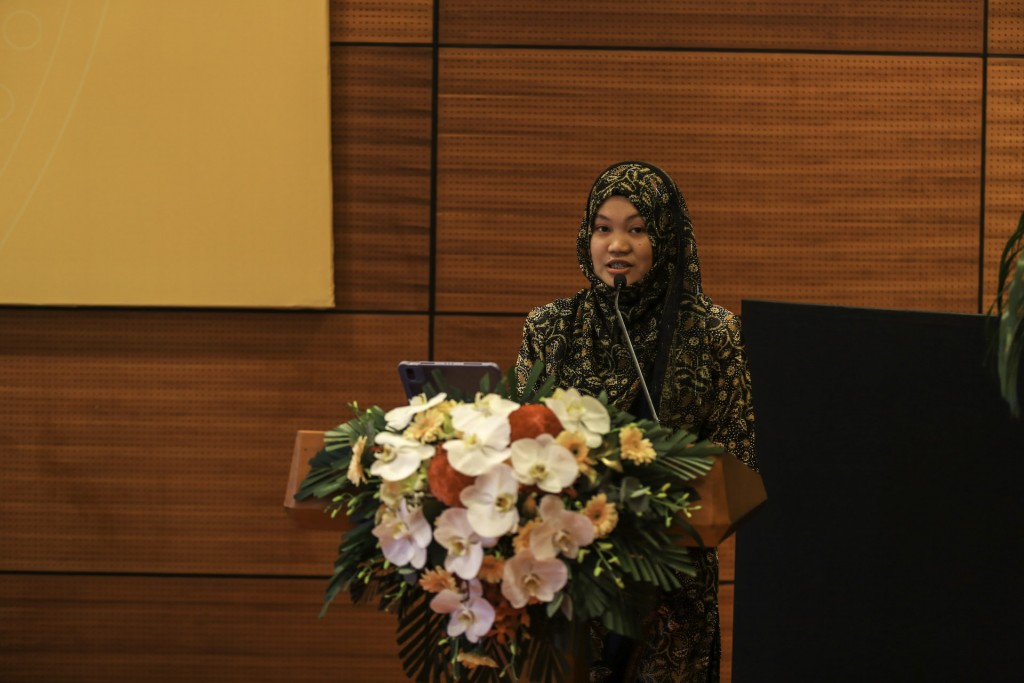
Ms. Princess Fahanna Azzizah Abas, Bangsamoro Transition Authority – Parliament, Barmm, Philippines presenting her paper.
Dr. Mhd Faheem Aliuden from Cotabato State University, Barmm and Ms. Princess Fahanna Azzizah Abas, Bangsamoro Transition Authority – Parliament, Barmm, Philippines, presented their paper “Governance performance among Barangays in Sultan Kudarat, Maguindanao Del Norte”. According to the presenters, in the Philippines, barangay officials play an important role in sustaining the needs and support of their constituency. As a counterpart of the regional government, the local government shall implement plans, programs, projects and activities to immediately respond to the call of its people. The findings reveal that Sultan Kudarat’s barangays have good governance performance but need to be strengthened, especially in environmental management, business friendliness, and competitiveness, and they need to be competent to adapt to the innovations and policies that directly affect its jurisdiction.
Dr. Chanda Gani, Bangsamoro Board of Investments, Office of the Chief Minister and Dr. Radzata Abdulgani, Cotabato State University, presented their paper “Local governments’ tax collection in attaining socio-cultural and economic development in South Central Mindanao, Philippines”. The two presenters emphasized that tax is an important and decisive factor because it enables a state to provide essential services for its citizens and accelerate economic development. Therefore, the local government’s tax collection has moderately contributed to sociocultural and economic development, and the local governments must intensify tax revenue so that the community shall religiously pay their tax obligation on time.
Dr. Maria Wendy Solomo from Partido State University, Philippines, presented her paper “Environmental chemistry education using inquiry-based learning in an online setting”. She believes that UNESCO’s 2030 Education for Sustainable Development Agenda will bring about the personal and social transformation needed to change course. This study uses an inquiry-based approach (IBA) in teaching environmental chemistry to enhance graduate students’ performance and attitude in an online environment. The outstanding IBA benefits are practical applications of concepts towards sustainable development, cognitive skills development, and producing more autonomous and environmentally responsible learners.
Dr. Naoki Fujiwara from Otemon Gakuin University, Japan, presented the paper “Sustainable governance for immigration management in Japan: The role of public involvement in the provision of Japanese language education”. In his presentation, Dr. Naoki Fujiwara emphasized that Japan is facing a significant labor shortage due to its aging population. Although the country has relatively relaxed regulations allowing foreign students to work part-time, it remains cautious about fully opening its doors to immigration. As a result, private Japanese language institutes have become a major channel for labor migration, leading to issues such as profit-driven immigration industries and employment mismatches. Given the growing international mobility in Asia, it is important to develop sustainable public governance for managing immigration and promoting socio-economic development.
Dr. Vu Thi Huong Thao and Dr. Pham Thi Diem from the National Academy of Public Administration presented their paper “Innovating public administrative service provision to meet the requirements of good governance”. According to them, public administration service provision is one of the most important functions and tasks of each state and is also a measure of good governance. In Viet Nam, improving the quality of public service delivery is always an important content that is particularly interested in reforming state activities in order to improve the effectiveness and efficiency of the state’s operations and
meet the increasing needs of the citizens. On the basis of clarifying the role of public administration service provision for good governance and the current situation of public administrative service provision in Vietnam, the article points out the existing problems and causes, thereby recommending solutions to innovate public administrative services provision to meet the requirements of good governance.
Following the morning session, Dr. Shohei Suyama, Local Autonomy College, Japan and Dr. Pham Ngoc Ha, National Academy of Public Administration, Viet Nam moderated the afternoon session with 11 speakers.
Afternoon session, Sub-theme 3
Dr. Vincent Wong, Chair of the EROPA Resolutions Committee, presented the paper “How ‘Rule of Law’ is implemented through the civil service training in Japan: The case of of Local Autonomy College (LAC)”. Dr. Vincent Wong discusses the following key themes: (1) For legal curriculum, what types of law would be studied in order to enhance the rule of law for good governance of the government officials? And Why? (2) For legal educators, how LAC recruits different legal educators to teach the rule of law for government officials? (3) For legal internalization, how participating government officials internalizes what they study from the rule of law? In conclusion, the presentation analyzes and consolidates why legal training is necessary for key social actors such as civil servants to uphold the rule of law for good public governance.
Assoc. Prof. Dr. Hoang Mai, National Academy of Public Administration, presented her paper “Developing capacity of leadership and management to foster good governance in Vietnam”. According to her, the leadership and management capacity of the public service in Viet Nam has achieved remarkable results, as evidenced by reliable indicators. However, there are still some limitations in the leadership and management capacity of the public service, most specifically in the institutional capacity. Therefore, there is a need for direction and solutions to develop leadership and management capacity to meet good governance requirements in Viet Nam, such as: (1) Developing a leadership and management capacity framework aligned with the requirements of good governance; (2) Innovating the management of officials and public servants according to the capacity framework; (3) Innovating the training of cadres, civil servants and public employees according to the philosophy of capacity development.
Dr. Peter Fong from the Hong Kong Public Administration Association presented his paper “Strategies for enhancing cross-border/city public governance for socio-economic development in China’s Greater Bay Area”. According to him, these strategies include (1) Coordination of city and regional plans holistically; (2) Division of roles amongst various cities based on their strengths; (3) Promotion of sustainable innovation and technology; (4) Mapping out infrastructural connectivity by constructing new bridges and high-speed rail links; (5) Building globally competitive industrial systems; (6) Reducing and simplifying cross border procedures and checking through use of information technology; (7) Ecological conservation for quality living and working.
On behalf of the group of speakers from the National College of Public Administration and Governance, University of the Philippines, Mr. Alce Quitalig presented the paper “SDG Budget Tagging Exercise for the Philippines”. The authors analyze the Philippines’ level of investments in sustainable development goals, namely SDG 3 on good health and well-being, SDG 4 on quality education, and SDG 5.6 target on sexual and reproductive health and reproductive rights in the Philippines. Some gaps could also be observed in performance data and information, posing a challenge to the effective monitoring of SDG outcomes.
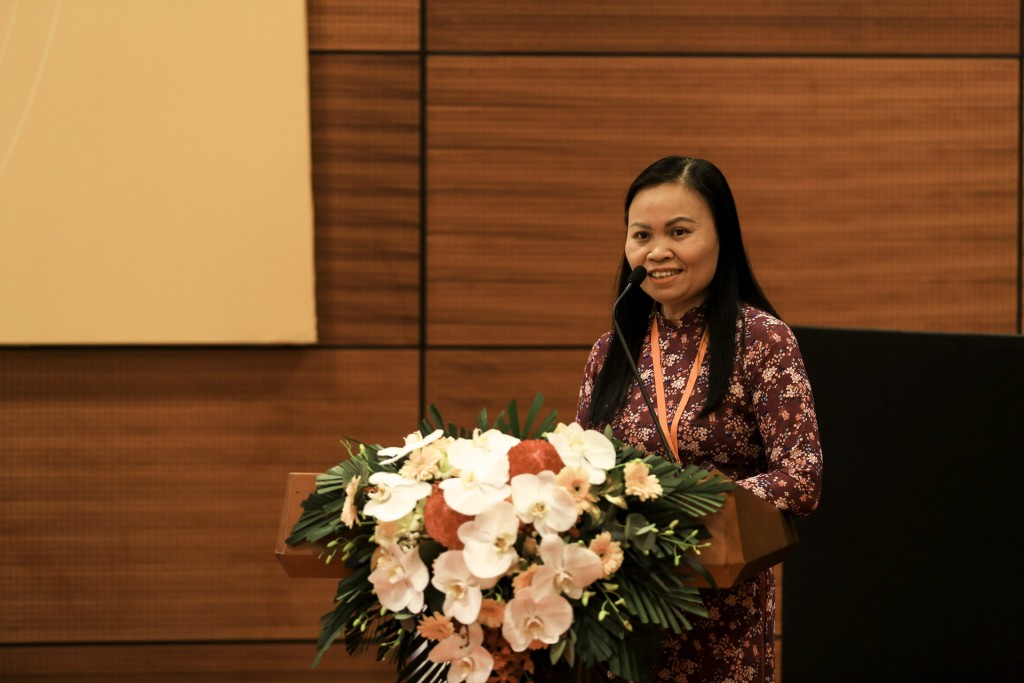
Assoc. Prof. Dr. Nguyen Thi Thu Ha, National Academy of Public Administration, presenting her paper.
Assoc. Prof. Dr. Nguyen Thi Thu Ha, National Academy of Public Administration, presented the paper “Complete the compact, efficient state organization to meet the requirement of good governance”. According to her, completing the organization of the state apparatus in a lean, effective and efficient manner is one of the requirements set before the goal of building good public governance. However, besides the achieved results, the streamlining of focal points, the consolidation of a number of agencies, organizations and units with similar functions and tasks also poses many problems to be solved, because in finally, the purpose of reforming is to improve the effectiveness of the state apparatus. The reform of the state apparatus will need to be implemented seriously and objectively on the basis of scientific and practical arguments. Effectively implementing the reform of state apparatus organization will contribute to building a strong state, meeting the requirements of building good public governance.
Dr. Alice Te, Hong Kong Public Administration Association, presented her research “Strategies on human resource development in public governance to promote socio-economic development in China’s Greater Bay Area”. In her presentation, Dr. Alice Te proposes some key strategies that should be implemented: (1) Talent attraction and retention; (2) Education and training to develop a highly skilled workforce through investing in world-class educational institutions and research facilities; (3) Cross-border collaboration to encourage the exchange of knowledge and technology through promoting collaboration between governments, universities, research institutes, and enterprises; (4) Public-private partnerships (PPP) by solving human resource challenges and improving public services; (5) Performance management and accountability by improving the effectiveness and efficiency of public governance.
Dr. Kenichi Nishimura, Osaka University, Japan, presented his paper “An empirical study on the relations between residents’ trust and performance of local government: case of the Philippines”. The study used the results of the 2019 public opinion survey on the local governance and performed statistical analysis, taking the Philippines as a case study to examine how trust in local government is related to local government performance. Solutions to improve the management capacity of public servants and local government officials across countries.
Prof. Jephte Munez, University of the Philippines, presented the paper “Sustainable budgeting for SDGS: Human-development and poverty reduction focused policy response from the Philippines”. According to him, with the negative effects of the Covid-19 pandemic which gravely affected the economic and human development of countries around the world, fiscal administration would require future thinking, and prudence in public policy designing and implementation to address transparency, accountability, and participation concerns in the pursuit of sustainable human development and poverty reduction.
Dr. Michael Tumanut represented the group of speakers from the National College of Administration and Governance, University of the Philippines, with the presentation “A content analysis of the Philippine Journal of Public Administration, 1990 – 2019”. The study aims to contribute to the understanding of trends in the research of public administration and governance scholars as manifested or represented in the Philippine Journal of Public Administration, as well as describe temporal shifts in research focus, approaches, and research practices. In terms of research approach and methodology, qualitative studies continue to dominate the journal, but the proportion of quantitative articles has increased steadily over the past three decades. Likewise, collaborative practice in the journal is gradually increasing, but geographical diversity is found wanting.
Mr. Reynaldo Brutas, Isabela State University, Philippines, reported on the research “Assessing the level of implementation and efficiency of administrative and finance services of LGU’s on the 3rd District of Isabela”. The study assessed the extent of the implementation of policies and programs and the efficiency of the implementation of administrative services among the Local Government Units of Isabela. The research uses descriptive and inferential research methods.
Sub-theme 3, with more than 20 presentations, addressed basic issues related to building public governance capacity. In the context of international integration and the rapid development of science and technology, topics such as e-government, expanding public-private partnerships, and enhancing connectivity between public servants and citizens with regional and global communities were raised and discussed by many participants. In order to improve the effectiveness of public governance, presenters also proposed increasing people’s participation and using media for state management, ensuring two-way interaction between the government and citizens.




